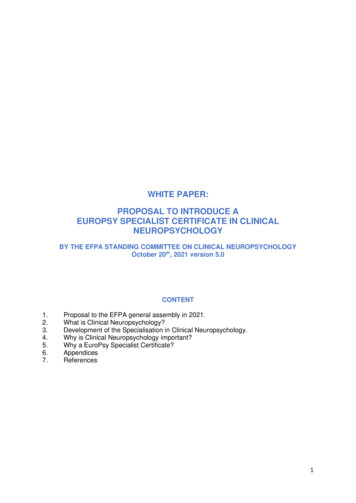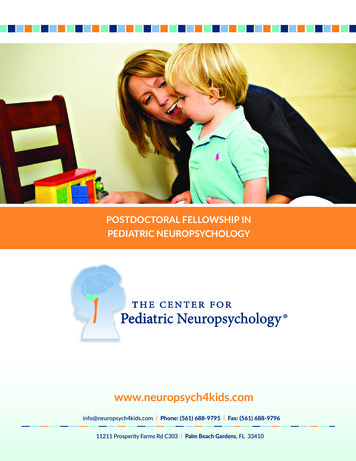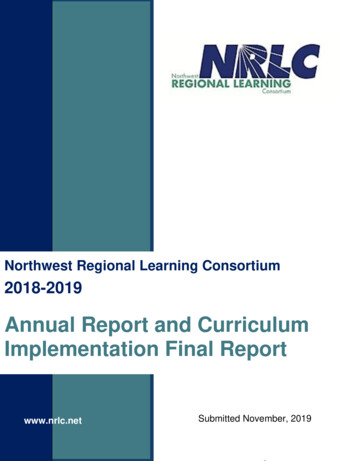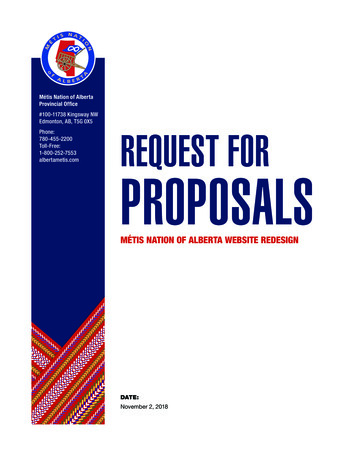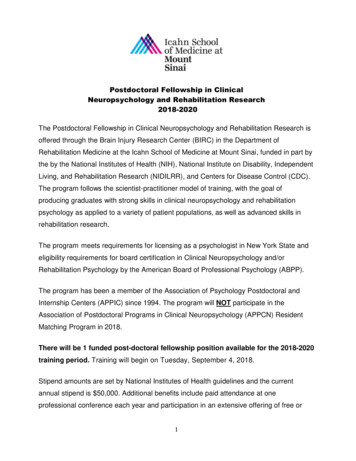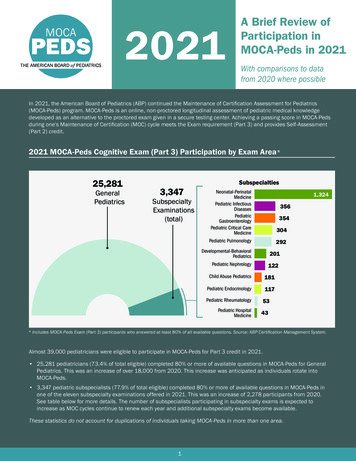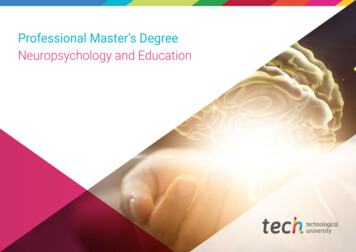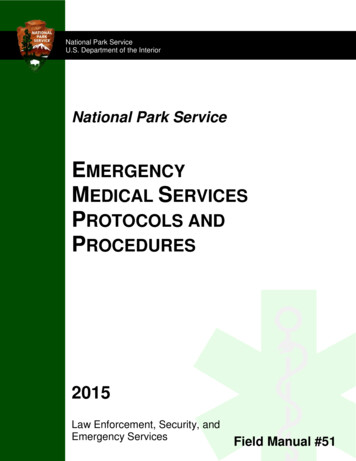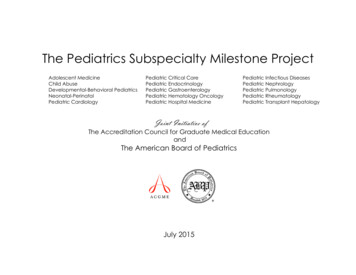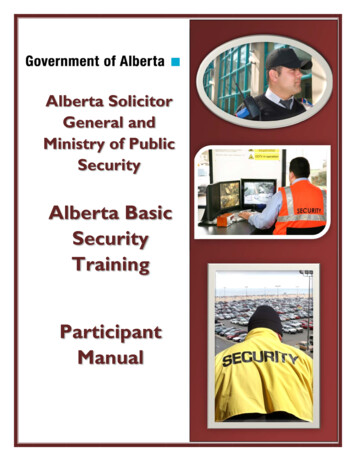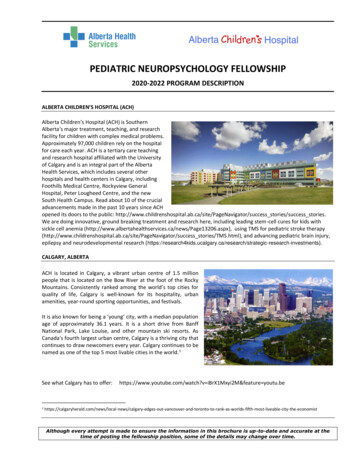
Transcription
PEDIATRIC NEUROPSYCHOLOGY FELLOWSHIP2020-2022 PROGRAM DESCRIPTIONALBERTA CHILDREN’S HOSPITAL (ACH)Alberta Children’s Hospital (ACH) is SouthernAlberta’s major treatment, teaching, and researchfacility for children with complex medical problems.Approximately 97,000 children rely on the hospitalfor care each year. ACH is a tertiary care teachingand research hospital affiliated with the Universityof Calgary and is an integral part of the AlbertaHealth Services, which includes several otherhospitals and health centers in Calgary, includingFoothills Medical Centre, Rockyview GeneralHospital, Peter Lougheed Centre, and the newSouth Health Campus. Read about 10 of the crucialadvancements made in the past 10 years since ACHopened its doors to the public: tor/success stories/success stories.We are doing innovative, ground breaking treatment and research here, including leading stem-cell cures for kids withsickle cell anemia 6.aspx), using TMS for pediatric stroke geNavigator/success stories/TMS.html), and advancing pediatric brain injury,epilepsy and neurodevelopmental research gic-research-investments).CALGARY, ALBERTAACH is located in Calgary, a vibrant urban centre of 1.5 millionpeople that is located on the Bow River at the foot of the RockyMountains. Consistently ranked among the world’s top cities forquality of life, Calgary is well-known for its hospitality, urbanamenities, year-round sporting opportunities, and festivals.It is also known for being a ‘young’ city, with a median populationage of approximately 36.1 years. It is a short drive from BanffNational Park, Lake Louise, and other mountain ski resorts. AsCanada’s fourth largest urban centre, Calgary is a thriving city thatcontinues to draw newcomers every year. Calgary continues to benamed as one of the top 5 most livable cities in the world.1See what Calgary has to offer:1https://www.youtube.com/watch?v iBrX1Mxyi2M&feature ough every attempt is made to ensure the information in this brochure is up-to-date and accurate at thetime of posting the fellowship position, some of the details may change over time.
PEDIATRIC NEUROPSYCHOLOGY FELLOWSHIP(2020-2022)NEUROPSYCHOLOGY AT ALBERTA CHILDREN’S HOSPITALWithin this multidisciplinary and collaborative healthcare environment, neuropsychologists function as consultants andprovide a wide range of clinical services. For example, this includes neuropsychological assessment of children with avariety of neurological and medical conditions such as intractable epilepsy, concussion/traumatic brain injury, stroke, braintumors, hydrocephalus, metabolic disorders, genetic disorders, cardiac conditions, and infectious diseases such asencephalitis and meningitis. Children are generally seen as part of comprehensive multidisciplinary investigationsrequested by treating neurologists, neurosurgeons, pediatricians, and physiatrists from a variety of clinics and programsacross the hospital.Currently, there are five full-time neuropsychologists involved in the fellowship, as well as affiliated members (seeAppendix A). The Neuropsychology Service has three neuropsychometrists (2.5 FTE), a masters-level research coordinator,and clerical support for administrative needs. Neuropsychologists function as members of multidisciplinary teams or asconsultants for physicians and treatment teams serving children and adolescents with complex neurological and medicalconditions.Research is an integral part of our mandate in neuropsychology. Alberta Children’s Hospital is on the University of Calgarycampus (www.ucalgary.ca) and is affiliated with the Faculty of Medicine at the University of Calgary and several institutesthat promote research in neurosciences and child health. These institutes include the Alberta Children’s Hospital ResearchInstitute (http://research4kids.ucalgary.ca/) and the Hotchkiss Brain Institute (www.hbi.ucalgary.ca). Neuropsychologists atACH conduct research in several different areas in addition to their clinical work (see Appendix B for a list of recentpublications). There is a range of continuing education activities for staff members and for professionals in the hospital andin the community.FELLOWSHIP GOALS AND TRAININGThe Pediatric Neuropsychology Fellowship at the Alberta Children’s Hospital is modeled after the goals set forth by theInternational Neuropsychological Society - American Psychological Association Division 40 Task Force on Education,Accreditation, and Credentialing, and by the Houston Conference on Specialty Education and Training in ClinicalNeuropsychology. We prepare fellows for a career as a scientist-practitioner in pediatric neuropsychology. Our graduateshave obtained board certification and are working in pediatric neuropsychologist positions at major Canadian andAmerican institutions, including Sick Kids, Kennedy Krieger, and Seattle Children’s Hospital.The goal of the fellowship is to train fellows to an advanced level of competence in pediatricneuropsychology consistent with independent practice in a tertiary health care setting, and to providefellows with experience in pediatric neuropsychology research.Training objectives are designed to train fellows who, by the end of the program, will:1.Demonstrate an advanced level of competence in pediatric neuropsychology sufficient forindependent practice.2.Demonstrate a strong knowledge base in clinical neuropsychology and clinical neurosciences.3.Be able to design and conduct clinical research within a hospital setting.2
PEDIATRIC NEUROPSYCHOLOGY FELLOWSHIP(2020-2022)STRUCTUREThis is a two-year fellowship designed to follow the program guidelines set forth by the Association of PostdoctoralPrograms in Clinical Neuropsychology (APPCN). Satisfactory performance in year 1 is necessary to advance to year 2. Ourfellowship positions include the following components, which can be tailored to meet the needs and goals of trainees: Clinical training (70-80% of time commitment) Didactic Experiences (10% of time commitment) Research (10-20% of time commitment, depending on fellow’s goals and demonstrated abilities)This translates into 3.5 to 4.0 days/week devoted to clinical work and clinical supervision, 0.5-1.0 days per week forresearch, and 0.5 days per week devoted for education/didactics. The exact proportion of clinical and research time will bedetermined according to the candidate’s training goals and their demonstrated abilities, but research is an expectation ofevery fellow. The exact proportion will be determined in collaboration with the program director, and may change as thefellow progresses through the program.In the second year of the program, fellows may also take part in supervising junior fellows, pre-doctoral residents,practicum students, and psychometrists.CLINICAL COMPONENTThe fellowship provides broad general pediatric neuropsychology training with a wide variety of neurological and medicalconditions (generalist training), with opportunities for the fellow to receive more in-depth training in specific areas ofinterest.On average, 3.5 to 4.0 days per week will be devoted to the clinical work. Primary clinical activities may include: 1)conducting inpatient/bedside and outpatient neuropsychological assessments with provision of reports and feedback tofamilies; 2) providing consultation to the multidisciplinary treatment teams, paediatricians, neurologists, andneurosurgeons during weekly team rounds and also individually; 3) providing consultation to the unique Dr. GordonTownsend School located within ACH; 4) providing consultation to external parties such as schools and communityorganizations; and 5) acute/emergency intervention arising from time to time (e.g., suicidal patients, child protection).Major Patient PopulationsNeurotrauma/Neurorehabilitation RotationThe Neurotrauma/Neurorehabilitation service provides intensive and in-depth experience and training in the field ofpediatric acquired brain injuries (i.e., moderate-to-severe traumatic brain injuries, cerebrovascular, hypoxic-ischemic,hydrocephalus, neurotoxic, autoimmune, infectious) and general neurology (i.e., complex and/or rare presentingconditions, such as neuromuscular, neuropsychiatric, and genetic disorders, as well as cases involving neurosurgicalintervention requiring pre-surgical evaluations and post-surgical follow-up, such as endoscopic third ventriculostomyfor hydrocephalus). Opportunities for involvement in cognitive rehabilitation and behavior managementprogramming may also be available for interested fellows.Slow Recovery Concussion/MTBI ClinicFellows have an opportunity to become involved in a weekly clinic that provides neuropsychological assessments foryouth who are slow to recover from a concussion/mild traumatic brain injury. This rotation provides a uniqueexperience for fellows because it provides a more rapid clinical service as part of patient management through theACH Brain Injury program.3
PEDIATRIC NEUROPSYCHOLOGY FELLOWSHIP(2020-2022)Hematology, Oncology, and Transplant (HOT) RotationThe Hematology/Oncology service provides intensive and in-depth experience and training in the fields of pediatriconcology/neuro-oncology (e.g., brain tumors, acute lymphoblastic leukemia, Hodgkins’ lymphoma, acute myeloidleukemia) and hematology (e.g., sickle cell anemia, hemophilia, diamond blackfan anemia, pre/post bone marrowtransplant). There are also opportunities for involvement (i.e., screening, consultation, brief intervention) in the LongTerm Survivors Clinic and Hemoglobinopathy Clinic. The HOT rotation also provides an opportunity to gainexperience in assessing a wide age range of children, from infancy to young adulthood (25 years old).Epilepsy/Epilepsy Surgery RotationThe Refractory Epilepsy service will provide direct training in the neuropsychological evaluation of children withseizure disorders, including training in pre-operative neuropsychological assessment of children evaluated forepilepsy surgery as part of multidisciplinary pediatric surgery work-ups. The fellow will participate in PediatricEpilepsy rounds at ACH, and in the combined adult-child Calgary Comprehensive Epilepsy Programme Surgical roundsat Foothills Medical Center. The fellow will gain experience in assessing children from the preschool age to youngadulthood, with most patients in the school-age range. Training in assessing quality of life and psychosocialadjustment of children with epilepsy comprises an integral part of the rotation, in addition to the assessment ofexecutive functions, memory, language, visual-spatial skills, and other neuropsychological domains. Training inspecialized techniques such as extra-operative language mapping may also be included, as well as opportunities tolearn techniques offered through the adult epilepsy program.Other patient PopulationsIn addition to the major patient populations described above, fellows will be exposed to other minor patientpopulations such as those from general neurology (e.g., stroke, AVM, Tuberous Sclerosis, Sturge Weber, Migraine,etc.), autoimmune disorders (e.g., Multiple Sclerosis, Acute Disseminated Encephalomyelitis, Neuromyelityis Optica,anti-NMDA receptor encephalitis, Lupus), Metabolic/Genetic Disorders (e.g., PKU, Niemann Pick Type C, Tyrosinemia,Galactosemia, Klinefelter, BPAN, Hypothyroidism, Glutaric Aciduria), cardiac, congenital, and craniofacial disordersand other medical conditions known to effect cognition (e.g., prematurity, cerebral palsy).Further, formal minor rotations may be arranged to provide experience with assessment or treatment of otherneuropsychological or general clinical populations of interest to the fellow. Minor rotations are optional, areavailable at the discretion of the fellowship director and/or program manager, and are only available to those fellowswho meet or exceed the clinical demands in their major rotations. Minor rotations will not exceed one day per weekof clinical time and shall not interfere with the major rotation duties.EDUCATIONAL/DIDACTIC COMPONENTClinical and Teaching RoundsA minimum of 0.1FTE (1/2 day) is dedicated for didactics. Fellows have access to a number of required and optionaleducational, research, and clinical didactics, including Pediatric Neuropsychology didactics, patient-focused rounds(i.e., Pediatric Epilepsy Rounds, Neurorehabilitation [Brain Injury] Team Rounds, Neuro-oncology Rounds),attendance at a number of teaching and clinical rounds (i.e., Neurology Teaching Rounds, Neuroradiology TeachingRounds, Developmental Neurosciences Grand Rounds, Pediatric Grand Rounds, Clinical Neurosciences Grand Rounds,Psychiatry Grand Rounds), and research-based meetings (i.e., monthly Neuropsychology monthly journal club,Alberta Children’s Hospital Clinician-Scientist Mentorship Group) offered at the hospital and affiliated sites, includingFoothills Medical Centre and the research institutes (e.g., Alberta Children’s Hospital Research Institute, HotchkissBrain Institute). Fellows are required to participate in the patient-focused rounds applicable to their rotation(s), toattend weekly educational and research rounds, and present cases at the teaching rounds.4
PEDIATRIC NEUROPSYCHOLOGY FELLOWSHIP(2020-2022)RESEARCH COMPONENTAll fellows take an active part in collaborative research with fellowship supervisors. Projects will be under theguidance of the supervisor and will almost always involve multidisciplinary research and clinical data. The supervisorwill work closely with the fellow to ensure that the project moves along smoothly and will provide assistance at allstages of the project. Fellows are expected to present their research at a conference and seek publication in a peerreviewed journal. Ideally, fellows will complete one to two peer-reviewed publications over the course of theirfellowship.RESOURCES AND EQUIPMENTThe Neuropsychology Service has several state-of-the-art pediatric testing suites for conducting neuropsychologicalevaluations. Each has digital audio-video equipment for remote observation and recording, including observationroom video monitors, DVD recorders, and remote camera controls. The Neuropsychology Service also has anextensive library of neuropsychological equipment and testing materials, clinical questionnaires, and scoringsoftware for conducting pediatric neuropsychological assessments, as well as a number of reference texts on clinicalneuropsychology.Fellows will be provided with office space and will have full access to computers, testing materials, library facilities,electronic journals, statistical and referencing software, and other supplies necessary for conducting their clinicalwork and research.SUPERVISION AND PROGRESS EVALUATIONSSupervision follows a mastery model:1.Observation (fellow of staff).2.Joint assessment/treatment (shared responsibility for case management).3.Observation (staff of fellow); the observation is direct, requires the staff to be in theroom/observation room and prepared to intervene if necessary.4.Fellow solo, with staff providing planning and debriefing sessions for each case (may use audio,video or one-way mirror to review sessions).5.Arms-length supervision; fellow carries a case load and cases are discussed at regularlyscheduled supervision sessions.After an initial screening period, fellows are expected to rapidly move to level 3, and would be expected to beworking at level 4 for the majority of their fellowship. Fellows are expected to be working at level 5 by the end of thefellowship, but often this occurs after the first year.Supervision each week will be conducted with case supervisor(s), and will include review of upcoming cases, reviewof current cases, and feedback on clinical reports. Total amount of formal supervision is at least 2 hours per week,5
PEDIATRIC NEUROPSYCHOLOGY FELLOWSHIP(2020-2022)with additional time for informal (non-scheduled) supervision. At the end of each four-month period, an interimprogress report will be completed and shared with the fellow and the Fellowship Director. A final report for eachmajor rotation will be completed at the end of the rotation. Continuation to the second year of the program iscontingent on satisfactory progress during the first year. A final exit evaluation will be completed with the director oftraining at the end of the second year of the fellowship.Fellows whose performance is not meeting expected levels will be directly informed of their perceived problemareas, and a plan for remediating these weaknesses will be formulated in conjunction with the fellowship supervisor,the fellowship director, and/or the discipline leader.ELIGIBILITYPlease note that for the 2020-2022 academic year, we will be recruiting 1 fellow.In order to be eligible, applicants must have (1) completed a CPA- or APA-accredited Clinical Psychology, ClinicalNeuropsychology, School Psychology, or Counseling Psychology doctoral program, (2) completed a CPA- or APAaccredited pre-doctoral internship, and (3) have substantial experience in clinical neuropsychological assessment ofchildren. In addition, all degree requirements must be completed before the start date.With respect to issues affecting our ranking process, please note that Alberta Children’s Hospital is an equalopportunity employer with a strong commitment to diversity of trainees. In accordance with Canadian immigrationregulations, preference will be given to qualified Canadian citizens. If a non-Canadian applicant is matched to ACH,the fellowship position will remain posted (Nationally) until all paperwork for the non-Canadian is complete and thatperson has successfully entered Canada on their work permit.SALARY AND BENEFITSStipend for fellows is 57,000 (Canadian funds) for the first year and 59,000 (Canadian funds) for the second year.The fellow will be provided with a standard employee benefits package that includes three weeks paid vacation ineach of year 1 and year 2 (i.e., 15 working days each year), plus 11 paid statutory holidays, and a basic healthbenefits plan. Funds for conference travel are not provided by the program, but can be applied for through theAlberta Children’s Hospital Research default/files/teams/6/trainees/award-tor travel-awards august-2018.pdf).START DATEThe fellowship training year runs from the first week of September until the final week of August. Adjustments tostart date may be negotiated with the director of training depending on individual circumstances.6
PEDIATRIC NEUROPSYCHOLOGY FELLOWSHIP(2020-2022)APPLICATION DEADLINEAll application materials must be received no later than midnight (Mountain Standard Time) on January 10, 2020.APPLICATION PACKAGEElectronic applications are preferred. Applications must contain the following 8 items to be considered complete.With the exception of the official graduate school transcripts (#6), director of training statement (#7), and referenceletters (#8) being sent directly to Dr. MacAllister, applicants should put items 1-5 in a SINGLE email. Please use thesubject, “Post-doctoral fellowship application package”. Conversion of documents to PDF (in the following order) isencouraged to maintain desired formatting when sending via email.1.Letter of interest2.Curriculum vitae3.Two sample de-identified pediatric neuropsychological reports4.Copies of representative publications (if applicable)5.Application form and checklist (please download application form and checklist from the sp).6.Official graduate school transcripts (sent directly from school to Dr. MacAllister)7.A statement from your graduate school clinical training director indicating your status in the program andprobability of completing all doctoral requirements prior to the start date of the fellowship (the latter iswaived for those already holding the doctorate) (sent directly from training director to Dr. MacAllister)8.Three letters of recommendation (sent directly from referees to Dr. MacAllister)INTERVIEWSAfter initial review of the application packages by the admissions committee, potential candidates will be contactedvia email to arrange an interview. Interviews may be conducted at INS 2020 in Denver. Interviews using Skype willalso be considered for fellows unable to travel. A candidate is welcome to travel to ACH for an in-person interview,but this is not necessary to be considered for the position.MATCH PROCEDURESOur program is an APPCN Member (APPCN match # 8471). Selection of a successful candidate will be accomplished inaccordance with the APPCN Match Policies. Candidates wishing to apply for the position must therefore register toparticipate in the APPCN Resident Matching Program (www.natmatch.com). Information on how to register, thedeadline for submitting rank order, and date of match announcements is available at the NatMatch website.This fellowship site agrees to abide by the APPCN policy that no person at this facility will solicit, accept, or use anyranking-related information from any fellowship applicant.7
PEDIATRIC NEUROPSYCHOLOGY FELLOWSHIP(2020-2022)INQUIRIESQuestions may be directed to William S. MacAllister, Ph.D., ABPP-CN at William.macallister@ahs.caWilliam S. MacAllister, PhD, ABPP-CNDirector, Pediatric Neuropsychology FellowshipNeurosciences Program, Alberta Children’s Hospital28 Oki Drive NWCalgary, AB, CANADA, T3B 6A8Moraine Lake, Banff National ParkPhoto credit: 1. Alberta Children’s Hospital, obtained from www.q107fm.ca; 2. Calgary Skyline, obtained from www.fergie.ca; 3. Moraine Lake, Banff National Park, obtainedfrom www.calgary.ca8
PEDIATRIC NEUROPSYCHOLOGY FELLOWSHIP(2020-2022)APPENDIX ANEUROPSYCHOLOGY FELLOWSHIP SUPERVISORS: BIOGRAPHICAL SKETCHES2CORE STAFF (Alphabetical)BROOKS, Brian, PhD, Neuropsychologist and Director of Neuropsychology Services; Neurotrauma/Neurorehabilitation Program(PhD: 2005, University of Calgary, Clinical Psychology; Fellowship training 2005-2007: BC Mental Health &Addiction Services and NeuroHealth Research & Rehabilitation)Dr. Brooks’ clinical work involves neuropsychological assessment of youth with acquired brain injuries (e.g.,concussion/traumatic brain injury, stroke, hydrocephalus, hypoxic-ischemic events). His current research focuseson outcome after acquired brain injury, performance validity tests, and test psychometrics. Research funding isprovided by the Canadian Institutes of Health Research, the Alberta Children’s’ Hospital Research Institute, andthe Cumming School of Medicine (University of Calgary).Websites: https://cumming.ucalgary.ca/neurodetect/; ooksRecent publications: http://www.ncbi.nlm.nih.gov/pubmed/?term Brooks BLFAY-MCCLYMONT, Taryn, PhD, Pediatric Neuropsychologist and Co-Director of Training – PediatricNeuropsychology Postdoctoral Fellowship Program; Neurosciences & Hematology/Oncology/TransplantPrograms(PhD: 2009, Ohio State University, Clinical Child Psychology; Fellowship 2009-2011: Alberta Children’s Hospital)Dr. Fay-McClymont’s interests are broadly focused on neuropsychological and neurobehavioral outcomes ofneurological and medical disorders in children and adolescents. An overarching interest includes examiningvariables that ameliorate or promote the persistence of neurocognitive difficulties in medical conditions. Specificpopulations of interest currently include brain tumour and leukemia survivors, sickle cell disease, andautoimmune encephalopathies.Website: y-mcclymontRecent publications: https://www.ncbi.nlm.nih.gov/pubmed/?term Fay-McClymont TMacALLISTER, William S., PhD, ABPP-CNBoard Certified Clinical Neuropsychologist with Additional Pediatric SubspecializationDirector of Training – Pediatric Neuropsychology Postdoctoral Fellowship Program(PhD: 2001, Palo Alto University, Clinical Psychology; Fellowship training 2001-2003: State University of NewYork at Stony Brook)Dr. MacAllister’s clinical work over the years has involved neuropsychological assessment of children andadolescents with demyelinating disease/Multiple Sclerosis, general ADHD/Learning Disabilities, Autism/AutismSpectrum Disorders, and Epilepsy/Epilepsy Surgery. He joined the team at Alberta Children’s Hospital after 11years at New York University, serving as a lifespan neuropsychologist in the Comprehensive Epilepsy Center witha focus on the assessment of children and adolescents with epilepsy. Research interests include cognition inpediatric epilepsy and the utility of performance validity measures in young populations.Recent publications: https://www.ncbi.nlm.nih.gov/pubmed/?term MacAllister WSMISH, Sandra, PhD, Rehabilitation Psychologist/Neuropsychologist; Vi Riddell Children’s Pain & RehabilitationCentre, and Dr. Gordon Townsend School Rehabilitation and Education Program.(PhD: 2008, University of Victoria, Clinical Psychology, Neuropsychology Specialization; Internship: KennedyKrieger Institute/Johns Hopkins University School of Medicine). Dr. Mish’s clinical work primarily involvesrehabilitation, with a focus on skill building and transition planning, as well as consultation andneuropsychological/psychoeducational assessments of children and youth with neuromotor issues andneurological and medical disorders.2Presented in alphabetical order for each section.9
PEDIATRIC NEUROPSYCHOLOGY FELLOWSHIP(2020-2022)VASSERMAN, Marsha, Psy.D., ABPP-CN,Board Certified Clinical Neuropsychologist with Additional Pediatric Subspecialization(PsyD: 2008, Widener University, Institute for Graduate Clinical Psychology; Fellowship training 2008-2010: NYULangone Child Study Center)Dr. Vasserman's clinical work over the years has involved neuropsychological assessment of children andadolescents with a wide range of neurodevelopmental and psychiatric disorders including generalADHD/Learning Disabilities, Autism Spectrum Disorder, Language Disorders, as well as other genetic,neurological and psychiatric conditions affecting cognition. She also worked closely with the cochlear implantteam to help provide neuropsychological evaluation services to this unique and often under-served population.She joined the team at Alberta Children’s Hospital after 8 years at New York University, serving as a pediatricneuropsychologist at the Child Study Center, with a focus on assessment of children and adolescents. Researchinterests include impact of neuropsychological evaluations on disease management in populations with chronicmedical conditions, brain development in hearing impairment, and utility of performance validity measure inchildren.Recent publications: https://www.ncbi.nlm.nih.gov/pubmed/?term Vasserman MYEATES, Keith Owen, PhD, ABPP-CN, Affiliated StaffNeuropsychologist, Professor of Psychology, Adjunct Professor of Pediatrics and Clinical Neurosciences,University of Calgary; Ronald and Irene Ward Chair in Pediatric Brain Injury(PhD: 1984, University of North Carolina at Chapel Hill, Clinical Psychology; Fellowship training: BostonChildren’s Hospital & Judge Baker Children’s Center)Dr. Yeates’ clinical work primarily involves consultation regarding childhood acquired brain injuries. Broadlyspeaking, his research aims to better understand the outcomes of childhood brain injury and influences onrecovery, and thereby foster more effective treatment and management. His current projects focus onconcussion and mild traumatic brain injury (TBI), in terms of both assessment and treatment. He is particularlyinterested in understanding the interplay of neurobiological and psychosocial factors in determining children’soutcomes after mild TBI, and how such factors can be modified through intervention to improve outcomes.Website: atesRecent publications: https://www.ncbi.nlm.nih.gov/pubmed/?term Yeates KO%20RESEARCH COORDINATORVIRANI, Shane, MSc. Research Coordinator, Neuropsychology and Pediatric Rehabilitation program(MSc: 2016, Simon Fraser University, Biomedical Physiology and Kinesiology)Shane manages and develops a variety of research projects related to brain injury, neuroimaging, and cognitivetesting. These projects all aim to enhance the functioning, outcome, and quality of life of children following abrain injury and to provide insight into novel techniques for injury prevention and rehabilitation.NEUROPSYCHOMETRISTSDAVID, Claire, B.C.R., Neuropsychometrist (Neuropsychology and Medical Psychology Teams)(University of Calgary, Cumming School of Medicine, Bachelor of Community Rehabilitation)MITCHELL, Lonna, B.A., Neuropsychometrist(University of Calgary, Linguistics with Speech Science Distinction)McCOLM, Lisa, B.A., Neuropsychometrist(University of Calgary, Psychology [Honours])10
PEDIATRIC NEUROPSYCHOLOGY FELLOWSHIP(2020-2022)APPENDIX BRECENT AND SELECTED NEUROPSYCHOLOGY FACULTY PUBLICATIONS BOOKSSherman, E.M.S. and Brooks, B.L. (Eds., 2012). Pediatric forensic neuropsychology. New York: Oxford University Press.Yeates, K.O., Ris, D.O., Taylor, H.G., & Pennington, B.F. (Eds., 2010). Pediatric neuropsychology: Research, theory, andpractice (second edition). New York: The Guildford Press.SELECTED BOOK CHAPTERSMacAllister, W.S., Brooks, B.L (In Press). Validity Testing in Pediatric Neuropsychology. In R. Booth, T. Murphy, and K.Zebracki (Eds). Paediatric neuropsychology within the multidisciplinary context: A guide for clinicians, academics, andstudents. MacKeith Press, UK.Harder, L., Liff, C.D., MacAllister, W.S. (2019). Multiple Sclerosis. In, K. Stucky, M. Kirkwood, and J. Donders (Eds.),Clinical Neuropsychology Study Guide and Board Review –
PEDIATRIC NEUROPSYCHOLOGY FELLOWSHIP (2020-2022) 3 STRUCTURE This is a two-year fellowship designed to follow the program guidelines set forth by the Association of Postdoctoral Programs in Clinical Neuropsychology (APPCN). Satisfactory performance in year 1 is necessary to advance to year 2. Our
